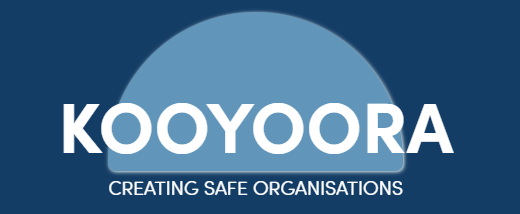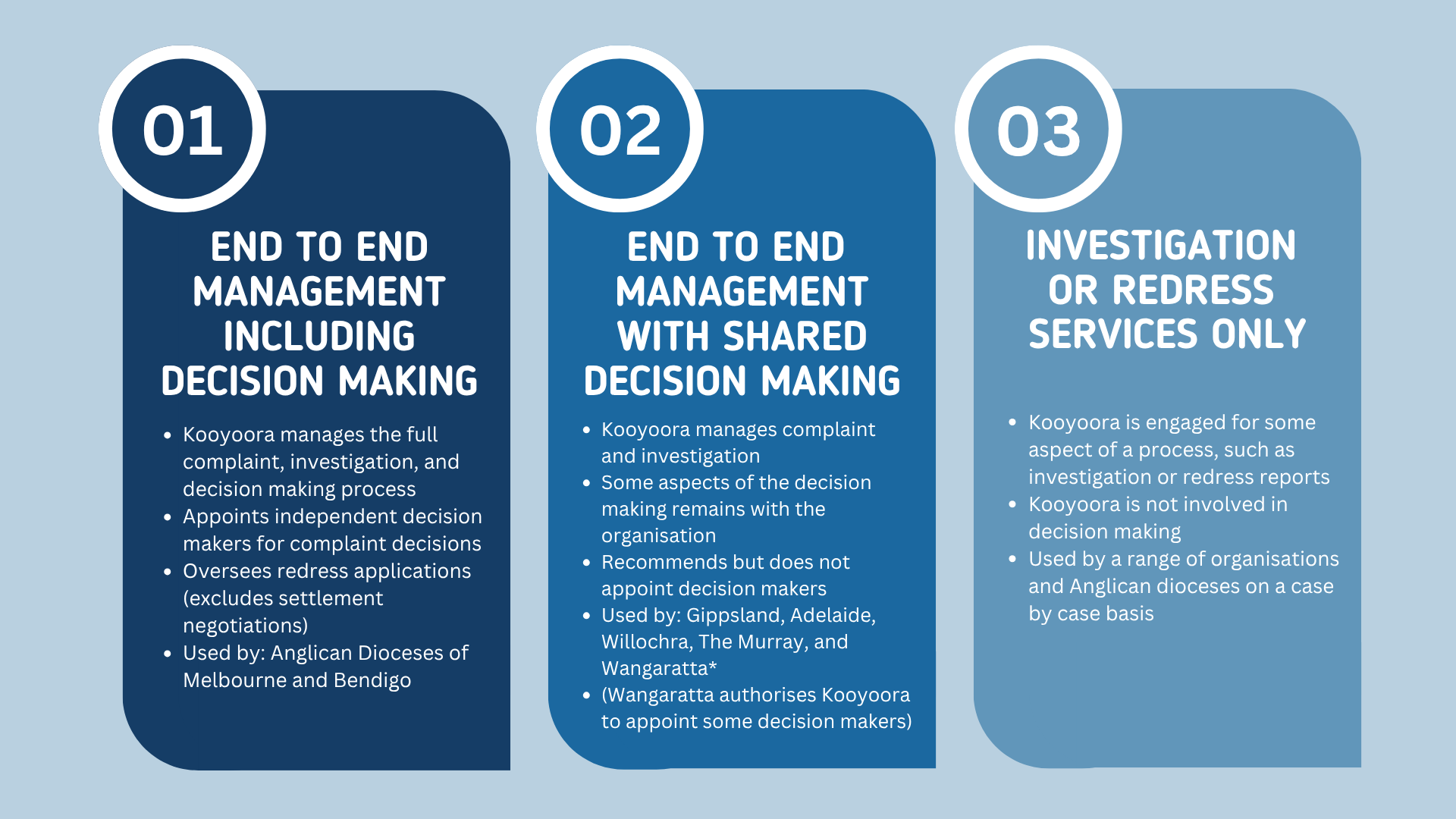Understanding the Roles of Anglican Dioceses and Kooyoora in Professional Standards
Kooyoora provides professional standards to 7 Anglican Dioceses within Australia and 13 Anglican Dioceses and Amorangi in Aotearoa, New Zealand and Polynesia. This service provision originated from the Anglican Dioceses of Melbourne and Bendigo and has evolved over the past 6 years. The service delivery arrangements have been flexible based on the diocesan requirements and needs whilst maintaining our core purpose of truth telling and independence.
The arrangements reflect a continuum of independence from fully independent managed services, including decision making, to contractual and discrete pieces of independent service delivery such as an investigation into a reported matter as explained in the graphic below.
The Continuum of Independence in Kooyoora's Service Delivery
Understanding the Roles of the Anglican Dioceses of Melbourne and Bendigo, and Kooyoora in Professional Standards
The Professional Standards Uniform Act (PSUA) was adopted by the Anglican Dioceses of Melbourne and Bendigo to ensure a consistent, transparent, and just approach to handling complaints of misconduct and assessing fitness for ministry. This legislation outlines a clear separation of responsibilities between the Dioceses and Kooyoora Ltd, the independent body contracted to deliver professional standards services.
The Role of the Anglican Dioceses of Melbourne and Bendigo
The Anglican Dioceses of Melbourne and Bendigo retain ownership and oversight of their professional standards processes. The respective Dioceses are responsible for:
Establishing the legislative framework: The PSUA was enacted by the Dioceses to govern how complaints are managed and how standards are upheld.
Setting policy and governance: The Dioceses define the ethical and procedural standards that clergy and lay workers must meet.
Appointing oversight bodies: It commissions review panels and receives reports on the operation of the PSUA, such as the 2022 review chaired by Hon. David Harper AM.
Providing redress options: The Dioceses offer survivors access to the Kooyoora Independent Redress Scheme as an alternative to the National Redress Scheme.
While the Dioceses own the process, they do not directly investigate or adjudicate complaints. That responsibility lies with Kooyoora and their appointment of the independent Professional Standards Committee, Board, Review Board and Ombudsman.
The Role of the Kooyoora Board
The Role of Kooyoora Ltd
Kooyoora is an independent, not-for-profit company contracted by the Dioceses to administer the PSUA. Its responsibilities include:
Receiving and investigating complaints: Kooyoora’s Office of Professional Standards handles allegations of misconduct involving clergy and church officers.
Conducting risk assessments and clearances: It processes applications for ministry and volunteer clearance and ensures compliance with child safety and ethical standards.
Managing redress and training oversight: Kooyoora facilitates redress for survivors and oversees the training system of the diocese and at times delivers specific professional standards training as required for clergy and lay workers.
Maintaining independent oversight: Kooyoora appoints and supports professional standards volunteers to independent decision-making bodies. Kooyoora operates independently of the Diocese to ensure impartiality and public confidence in the integrity of the process.
This separation ensures that complaints are handled without conflicts of interest, and that survivors and respondents alike are treated fairly.
The following independent decision-making bodies are staffed by volunteers that have been appointed by the Kooyoora Board, as part of the governance oversight as established in the PSUA. Their responsibilities include
Professional Standards Committee
Investigates complaints of misconduct by Church workers.
Refers matters to the Director of Professional Standards for further action.
May recommend interim measures (e.g. suspension) to protect others during investigations.
Works closely with the Director to assess risk and determine appropriate responses.
Can refer serious matters to the Professional Standards Board for formal determination.
Professional Standards Board
Conducts formal hearings into allegations of misconduct.
Determines whether a Church worker is fit for ministry or service.
Can impose sanctions, including removal from ministry or placing conditions on service.
Operates independently of the Committee to ensure procedural fairness.
May review clearances for ministry or service when concerns arise.
Professional Standards Review Board
Reviews decisions made by the Professional Standards Board upon request.
Ensures decisions are fair, reasonable, and consistent with the Act.
Provides an avenue for appeal by complainants or respondents.
Can affirm, vary, or overturn decisions of the Board.
Promotes accountability and transparency in disciplinary outcomes.
Professional Standards Ombudsman
Oversees the integrity of the professional standards system.
Receives and investigates complaints about the handling of misconduct matters.
Ensures processes are fair, respectful, and trauma-informed.
Can make recommendations for systemic improvements.
Acts as an independent safeguard for complainants and respondents.
Key Performance Indicators
As part of the contract with the Anglican Diocese of Melbourne, a range of Key Performance Indicators are set for Kooyoora to meet or exceed every year. These KPIs include:
Quality of information presented to the Professional Standards Bodies (in order to facilitate optimum decision making) determined by annual survey of Professional Standards Volunteers
Consistency of the application of the PSUA (application of process 95%)
Supports to be provided to respondents, complainants, Kooyoora Independent Redress Scheme Applicants and parishes (where required)
Clearances finalised (completed within a week, once all information is received)
Intake calls responded to within 24 hours (business days)
Matters not progressing to PSB/PSRB (outcome between 6 weeks and 3 months)
Matters progressing to PSB (outcomes between 8 to 14 months for Kooyoora, excludes police and other statutory bodies time)
Matters progressing to PSRB (outcomes with a further 6 to 8 months for Kooyoora, excludes police and other statutory bodies time)
Redress applications acknowledged within 3 business days
Financial transparency is achieved through the costs of services being estimated each year through review of service demand, pattern trends and forecasting any known activity.
File quality (95% compliant to agreed file audit)
Quality Improvement (Quarterly reports will include any preventative themes and areas for improvement)
Kooyoora has met or exceeded all KPIs every year since it was established in 2017, noting that there may be outliers due to complexity. These complexities are reported to the diocese.
Understanding the Roles of the Anglican Dioceses in Australia (other than Melbourne and Bendigo), and Kooyoora in Professional Standards
Each diocese has its own set of professional standards acts and ordinances. Kooyoora has a contractual relationship with these dioceses as opposed to Melbourne and Bendigo, where Kooyoora’s role and function is embedded into their PSUA.
Understanding the Roles of the Anglican Dioceses of Aotearoa, New Zealand and Polynesia, and Kooyoora in Professional Standards
The Anglican Church in Aotearoa, New Zealand and Polynesia has a legislative framework with an appointed Ministry Standards Commission (MSC). The MSC is comprised of Commissions and Registrars. The Registrars have a role similar to the Director of Professional Standards and the Professional Standards Committee.
Why Delays Can Occur
While the system is designed to be just and thorough, it can also take time as there are many processes that must be undertaken. Each professional standards act and ordinance mandates its own detailed procedures for investigation, natural justice, and review. These include:
Assessing risk, managing reporting obligations and coordination of investigative processes
Gathering evidence and witness statements
Providing opportunities for response and legal representation
Convening independent panels for determinations
The process needs to work in conjunction with other services such as police, child protection and the reportable conduct scheme regulators. This can mean that Kooyoora’s work is put on hold for a period of time while statutory services conduct their work.
There are also clear procedures that must be undertaken as part of clearance for ministry and clearance for service that can take time with requirements to be undertaken by both the Dioceses and Kooyoora. This primarily includes follow up with people regarding the components of the clearance.
Such rigor is essential for fairness but can lead to delays in outcomes, especially in complex or sensitive cases. These delays are not due to inaction but reflect the weight and care required in handling serious allegations.
All professional standards Acts and Ordinances are collaborative frameworks: each Diocese owns its own processes and sets the standards, while Kooyoora delivers the services independently. This model balances accountability with impartiality. While the process can be demanding, it is designed to uphold justice, safety, and integrity within the Church community.





